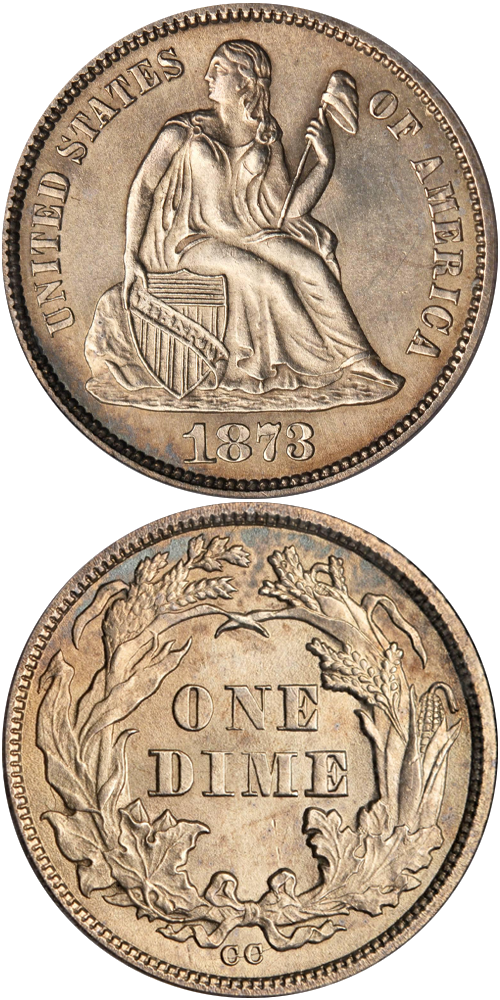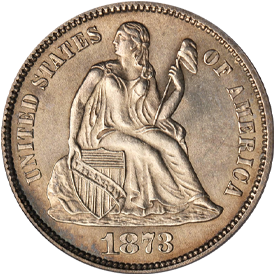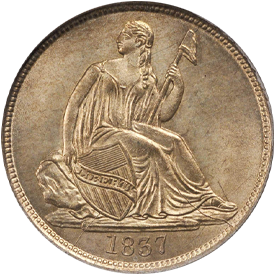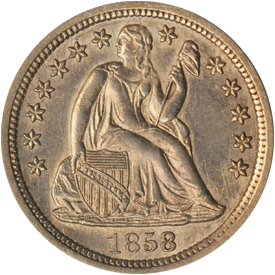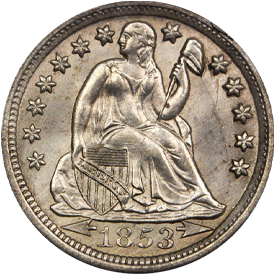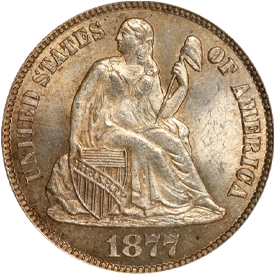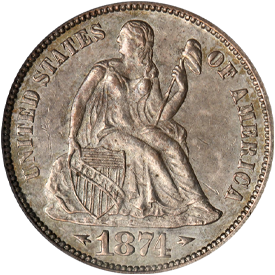After first being tested with limited strikes on the dollar coin, Christian Gobrecht’s Liberty Seated design made its first widespread debut for circulation on the half dimes and dimes of 1837. As had been seen on the early dollar coins, no stars surrounded the figure of the seated Liberty on the obverse lending a somewhat cameo-like appearance to the coins.
The following year, thirteen stars were added around Liberty, and two years after that, in 1840 drapery was added to her left arm. Coincident with the addition of this small bit of drapery was a re-engraving of the entire figure by Robert Ball Hughes, which unfortunately stripped much of the artistic beauty and grace from Gobrecht’s original design. While these modifications were seen mainly on the half dime and dime, and to a lesser extent on the quarter, the half dollar was spared much of these “improvements” and retained most of its original elegance.
Two changes in weight to the dime were marked by arrows next to the date – the first in 1853-55 to mark a decrease, and the second in 1873-74 to signify a very small increase. In 1860, the legend “UNITED STATES OF AMERICA” was moved from the reverse to the obverse, replacing the stars, and the wreath was enlarged on the reverse.
An absolutely complete set of Seated Dimes is all but impossible, with the unique 1873-CC No Arrows well into seven-figures. The other “CC” dates prior to 1875 are difficult, as are the early “S” mints of the mid and late 1850s, the Philadelphia issues of the mid 1860s, and the 1885-S.
Further Reading
Dimes of this style are treated in a book, Encyclopedia of United States Liberty Seated Dimes 1837-1891, by Kamal M. Ahwash. More than anything else, the volume is a "picture book" illustrating numerous varieties of dimes within the span indicated. To date, relatively few numismatists have expressed a desire in collecting Liberty Seated dimes by minute die varieties. Especially toward the end of the date span, die differences are so tiny that a microscope is needed to differentiate them. There is, however, an interest in collecting Liberty Seated dimes by date and mintmark sequence and by major varieties. And, of course, even more collectors desire specimens by design types within the series.
Dimes of the Liberty Seated type closely follow half dimes in design. They can be broken down into several different sub-types.
Proof Issues
Beginning in 1858 Proofs were first generally distributed to collectors. In that year 80 Proof sets were sold. Although Proof dimes (and other silver coins) of earlier dates are occasionally seen, those encountered with regularity are dated 1858 onward. Proof production did not necessarily equate with Proof distribution, and it is probably the case that many hundreds were melted. It was the mint practice to produce sets on speculation and put them "on the shelf" to await orders.
The availability of top-grade (Proof-63 and higher) dimes of the 1858-1891 years is approximately proportional to the published mintage figures, except that the further one goes back in time, the greater is the chance that a given piece may be damaged or impaired. Thus, of a given 100 Proof dimes of the 1860 decade, fewer top-grade pieces are found than would be located among a given 100 surviving Proof dimes of the 1880 decade. Putting together a complete date sequence of Proofs from 1858 through 1891 is no small task, and I suspect that a year or more would be required to get all of the different issues in Proof-63 or finer preservation. With each passing year, more coins are cleaned and treated, making the surviving un-impaired coins even rarer in a relative sense.
